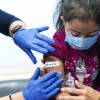COVID-19 cases have surged throughout the last two winters — but as we come out of summer and temps begin to drop, public health conditions not only feel different, they are different, two local public health experts said.
GBH News spoke with Bill Hanage, associate professor of epidemiology and co-director of the Center for Communicable Disease Dynamics at Harvard’s T.H. Chan School of Public Health, and Dr. Shira Doron, the hospital epidemiologist at Tufts Medical Center, to understand what the pandemic might look like this year as the seasons change.
This fall and winter look better than the last two...at least, as of now.
“We are in a totally different place than we were this time last year,” Doron said, “And a different planet compared to where we were two years ago this time. And a lot of that is our layers of immunity, layers from vaccination and infection.”
Hanage agrees things have improved, but does add that he expects fall and winter to bring a rise in COVID infections. And he said even if coming infections result in fewer hospitalizations, he’s concerned that the health care system — having been strained over the past two years — could still be seriously stressed by any potential surge once again.
Get the newly reformulated booster vaccines, if eligible.
The new vaccines should offer enhanced protection against the most current strains of coronavirus, including the BA.5 variant, which accounts for around 90% of infections right now.
Doron said we don’t know just how effective the vaccines are at preventing infection, but she and Hanage are confident that the new boosters, like previous versions, will offer long-lasting protection against developing severe disease if someone is infected.
Public schools should not be a big worry, even if there’s little-to-no masking.
When asked about back-to-school, Doron said masks are optional and that's OK. “The vast majority of children have already had COVID and therefore have immunity, rendering the virus similar in risk to others for which we never considered masking.”
Hanage said that dropping masks in schools will result in more infections, but added “that's unlikely to be very consequential in terms of the total burden on health care and total numbers of severe disease.”
Doron emphasized that, with masking and other precautions creating obstacles to learning, and few other public settings still requiring masks, mandating masks in schools makes little sense.
The virus can always throw a big curveball.
Perhaps the one thing experts can agree on is the degree of unpredictability with the SARS-COV-2 virus as it continues to mutate and put out new variants.
“We may see a massive surge [this winter],” Doron said. “But we may have so much immunity from Omicron — and if there isn't a new variant that emerges and out-competes what we have now, which is mostly BA.5, we could also get lucky and not see an uptick in winter.”
Hanage said it’s an open question whether BA.5 will be dominant in a few months, and he has his eye on some newer variants with mutations that raise concern.
“We've got a hell of a lot of immunity from people who were infected as well as vaccinated," he said. "That kind of hybrid immunity, we think, produces more durable protection, and is the kind of thing which is going to make surges more manageable going forward, because it's going to be more of a challenge for the virus to be able to infect a lot of us in short order.”
Like we said, though…watch out for that curveball.
According to Hanage, “absent a change,” a fast, ‘icepick’-style spike of cases like we saw with Omicron last winter is “very unlikely — but, you know, I've said it to you before, I never bet against natural selection.”
"We don't like to make predictions,” said Doron, “because there's one thing we know about predictions, and that's that they will be wrong. This virus surprises us at every turn."








